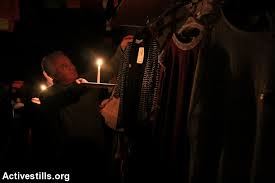Palestinian villagers living in desolate, off-grid areas in the West Bank have begun using biogas generators that supply free, clean energy by gobbling up organic waste.
 Palestinian villagers living in desolate, off-grid areas in the West Bank have begun using biogas generators that supply free, clean energy by gobbling up organic waste.
Palestinian villagers living in desolate, off-grid areas in the West Bank have begun using biogas generators that supply free, clean energy by gobbling up organic waste.
The portable, household "anaerobic digesters" made by the Zionist start-up company HomeBioGas turn food leftovers and manure into methane for cooking and lighting.
They can be taken along if people living in ramshackle huts or tent dwellers, such as local Bedouin, decide to relocate or move home.
"HomeBioGas has invented this simple digester that can easily be assembled and transported," said Palestinian engineer Amer Rabayah, who coordinates installation of the devices.
Rural West Bank areas that Palestinians want as part of a future state with the Gaza Strip and East Jerusalem have been left under-developed, while the occupation entity, which captured the territory in a 1967 Middle East war, has invested in adjacent settlements.
Palestinians - largely left to fend for themselves - have relied on donations from foreign states and international aid agencies.
"(In) this area ... there is no water or electricity. We have no services," said local resident and digester owner Nayef Zayid.
Around 40 digesters have been set up in a pilot project at the Palestinian village of al-Awja in the central West Bank's Jordan Valley.
The European Union has funded the project to the tune of some 500,000 euros ($559,750), and the Peres Center for Peace, set up by former Zionist president Shimon Peres, facilitated Zionist-Palestinian cooperation.
A group of Zionist and Palestinian volunteers helped assemble the digesters, which take about three hours to install.
Some digesters have also been provided to Bedouin in the Zionist entity in partnership with the Arava Institute for Environmental Studies, based in the arid Negev desert.